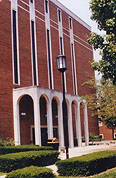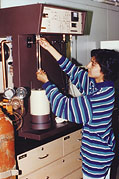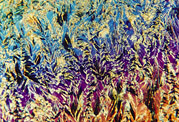
Center for Pharmaceutical Processing Research (CPPR)
Purdue University
A National Science Foundation Industry/University Cooperative Research Center since 1995
Partner Institutions:
- University of Connecticut
- University of Puerto Rico
Reducing time to market and controlling manufacturing costs are key components of future competitive success for the pharmaceutical industry

|
Center Mission and Rationale
The Center for Pharmaceutical Processing Research (CPPR) was established to advance understanding of how unit operations in the manufacture of pharmaceutical dosage forms influence critical quality attributes of pharmaceutical products, to explore novel processing technology aimed at improving product quality or decreasing cost, to develop and implement improved process monitoring methods, to foster an interdisciplinary approach to pharmaceutical processing research, and to catalyze scientific interaction between academic scientists and their counterparts in the pharmaceutical industry.
Research Program
The theme of the Center's research program is the application of physical chemistry and materials science to better understand, at a molecular level, the influence of processing conditions on the quality of pharmaceutical dosage forms. Major areas of research interest are:

|
- Process Modeling -- Application of mathematical algorithms can minimize the amount of trial and error experimentation needed to develop optimized processes. In the "Smart Freeze Dryer" project, a model of heat and mass transfer is applied to the analysis of the transient pressure response when the valve between the chamber and condenser is briefly closed during primary drying. This analysis gives product temperature data as well as vial heat transfer coefficient and product mass transfer coefficient. When fully developed, this method will allow development of an optimized drying cycle in one trial batch.
- Sterilization of Disperse Systems -- The method of choice for sterilization of injectable drug products is terminal sterilization. This presents a special challenge for disperse systems, such as suspensions and emulsions, where thermal treatment can result in breaking of emulsions and particle growth in suspensions. The long-range goal of the research is to develop a better understanding of how formulation factors and processing conditions interact to influence the behavior of these systems during terminal sterilization.
- Monitoring of Powder Processing -- As the trend toward development of drug products containing lower doses of more potent drugs continues, the importance of validating the effectiveness of powder blending operations becomes more critical. Photon migration measurements have the potential for allowing non-destructive, real-time measurement of content uniformity during powder blending operations. Center investigators have also developed an instrument for measuring the chargeability of pharmaceutical powders, along with an empirical database of electrical chargeability of pharmaceutical excipients. The long- term objective of this project is to understand the role of electrical charge in blend uniformity of powders.
- Drying -- Drying is often a poorly controlled step in the production of a drug substance, particularly when hydrates or solvates are formed. Current effort is directed at using model drug compounds to test the hypothesis that drying is really a crystal growth process involving the nucleation and crystal growth of the anhydrous phase in the presence of a hydrate. Freeze drying is also a major research program in the Center. The goals of this program are to establish an analytical basis for development of freeze-dried formulations and processes instead of the traditional empirical approach, and to improve the technology for monitoring the freeze-drying process.
- Granulation Processes -- Granulation is a critical unit operation in manufacture of solid oral drug products that are not directly compressed. Current research interest in granulation is directed toward developing a better ability to predict outcomes such as granule strength and shape after wet granulation as a function of the morphology and physical-chemical properties of particles prior to the granulation process. Roller compaction is another aspect of granulation, which is being studied with an overall objective of better prediction of the characteristics of the granule as a function of characteristics of the powder blend and operating parameters of the equipment.

|
Special Center Activities
With the inclusion of the University of Connecticut and the University of Puerto Rico, CPPR is now a multi-university Center.
CPPR has sponsored two international symposia on the freeze-drying of pharmaceuticals and biologicals.
Center Headquarters
Center for Pharmaceutical Processing Research
Department of Industrial and Physical Pharmacy
Purdue University
1336 Pharmacy Building
West Lafayette, IN 47907-1336
Tel (765) 494-1401 * Fax (765) 494-6545
Homepage: www.pharmacy.purdue.edu/~nsf/
Center Director: Dr. Steven L. Nail
slnail@pharmacy.purdue.edu
Associate Director: Dr. Dane O. Kildsig
(765) 494-1484 * kildsig@purdue.edu
Associate Director: Dr. Evone Ghaly
(787) 758-2525 * eghaly@rcm.upr.edu
Associate Director: Dr. Michael J. Pikal
(860) 486-3202 * pikal@uconnvm.uconn.edu
Center Evaluator: Dr. Kenneth R. Heimlich
(610) 738-0984 * rxmrk@aol.com
NSF 01-168pp